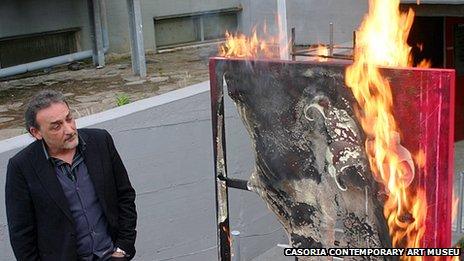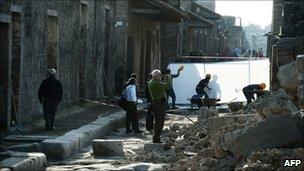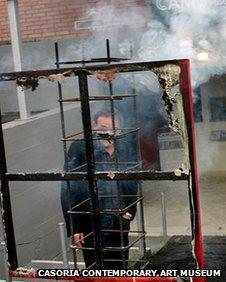Italian museum burns artworks in protest at cuts
- Published
- comments

Museum director Antonio Manfredi set fire to the first painting on Tuesday
A museum in Italy has started burning its artworks in protest at budget cuts which it says have left cultural institutions out of pocket.
Antonio Manfredi, of the Casoria Contemporary Art Museum in Naples, set fire to the first painting on Tuesday.
"Our 1,000 artworks are headed for destruction anyway because of the government's indifference," he said.
The work was by French artist Severine Bourguignon, who was in favour of the protest and watched it online.
"The survival of the museum is such an important cause that it justifies the despicable, and painful, act of destroying a work of art," she told the BBC.
"My work burned slowly, with a sinister crackle. It cost me a lot, but I have no other means of protesting against the loss of this institution."
Mr Manfredi plans to burn three paintings a week from now on, in a protest he has dubbed "Art War".
Artists from across Europe have lent their support, including Welsh sculptor John Brown, who <link> <caption>torched one of his works</caption> <url href="http://www.youtube.com/watch?feature=player_embedded&v=aeguUCcfIU8" platform="highweb"/> </link> , Manifesto, on Monday.
Welsh sculptor John Brown sets fire to one of his works in support of the Italian protest
Mr Brown told the BBC that his organisation, the Documented Art Space in Harlech, North Wales, had exhibited at the Casoria museum in the past.
He said the loss of his artwork had not been particularly upsetting.
"We work in a fairly contemporary manner so the process of making art, and the interaction with people, is more important than keeping it as a precious object."
He called the burning "a symbolic act" to "protest against the way the economic crisis is being dealt with".
"These cuts reach beyond the confines of the visual arts and affect the cohesive well-being of millions of people all over the world."
Italy's debt crisis led to the resignation of Prime Minister Silvio Berlusconi last year. Since his departure, the government has passed a tough package of austerity measures and other reforms.
Art institutions says they have been particularly affected by the country's economic woes, with state subsidies and charitable donations drying up.

Unesco criticised the "lack of maintenance" at Pompeii earlier this year
One of Italy's leading galleries, the Maxxi Museum of Contemporary Art, said its funding had been cut by 43% in 2011.
When its board of directors failed to approve the 2012 budget last week, the Culture Ministry took steps to replace them with a government-appointed administrator.
International concern was also raised last year over the neglect of Pompeii, one of the world's most precious archaeological sites.
A number of structures in the ancient city have fully or partially collapsed, including the "House of Gladiators" which fell down 18 months ago.
However, Prime Minister Mario Monti announced a 105m euros (£87m) project to reconstruct the ruins earlier this month.
'Adverse circumstances'
Mr Manfredi is known as an outspoken and radical museum director.
He opened the Casoria gallery in his hometown, just outside Naples, in 2005 and several of his exhibitions have drawn the ire of the local mafia.
In 2009, a lifesize effigy of an African figure was left impaled over the museum gates following an exhibition of art that dealt with prostitution - a trade occupied locally almost entirely by African immigrants and controlled by organised criminals.

Bourguignon's painting was completely destroyed
Manfredi has also blamed the theft of security cameras and several attempted break-ins on the mafia.
His attempts to focus attention on his museum's funding crisis have been crafted with a keen eye for publicity.
Last year, he announced he had written a letter to German Chancellor Angela Merkel asking for asylum, saying he was fed up with the government's failure to protect Italy's rich cultural heritage.
He said he would take his entire museum with him if the asylum was granted, but never received a reply.
He said the latest protest will continue unless the funding situation improves.
A statement from the museum described the first burning as "political, necessary, and compelling in the face of these adverse circumstances".
- Published5 April 2012
- Published27 January 2012
- Published12 November 2010
- Published11 November 2011
- Published25 August 2010